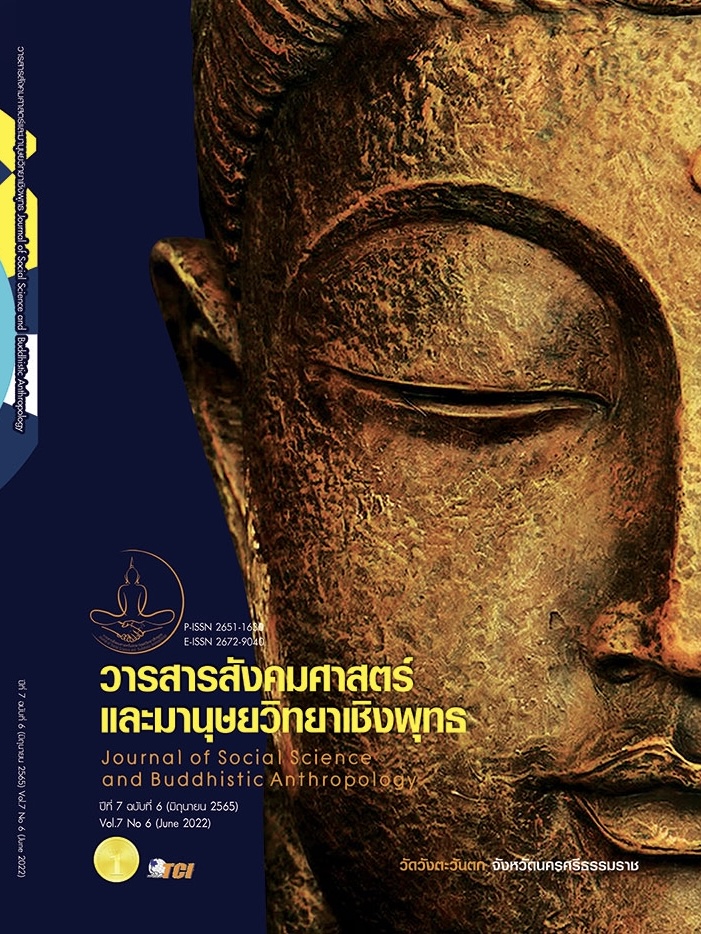DEVELOPMEMT OF A CAUSAL RELATIONSHIP MODEL FACTORS AFFECTING THE LOYALTY OF FOREIGN TOURISTS TOWARDS TOURISM IN THAILAND
Keywords:
Developing Model, Casual Relationship, Factors Affecting Loyalty, Foreign TouristsAbstract
The objectives of this research article were: 1) study compare the point of views about Asian and European tourists on travel destinations in Thailand, according to image of service quality expectations; value recognition satisfaction and loyalty, 2) study analyze the direct and indirect influences between the images of service quality expectations; value recognition and satisfaction with loyalty ,3) developed a causal relationship model for factors affecting overall foreign tourist loyalty, and 4) developed a causal relationship model for factors affecting the loyalty of both Asian and European tourists to Thailand tourism. The study was mix research method such as quantitative research by using a questionnaire , stratified randomized sampling group Asian and European tourists of 600 people. By using LISREL technique for analyzed frequency, percentage, mean, standard deviation, Skewness, Kurtosis. And qualitatively of a specific randomized interview was used. The informants was foreign tourists of 10 people, content analysis and summary. The study was found that: 1) Asian and European tourists have point of views on tourism in Thailand different in terms of value perception and satisfaction, statistically significant at the 0.05 level; it was found that Asians are more valued and satisfied than Europeans, 2) Destination image and service quality expectations both had a direct influence and indirectly impacts are perception of value and satisfaction, statistically significant at the 0.05 level, 3) causal relationship model for factors affecting overall foreign tourist loyalty to the empirical data (p-Value > 0.05 and GFI > 0.95) and 4) The causal relationship model for Asian and European tourists conformed to the empirical data (p-Value > 0.05 and GFI > 0.95).
References
กมล เกียรติพงษ์. (2563). การพัฒนารูปแบบความสัมพันธ์โครงสร้างเชิงสาเหตุของปัจจัยที่ส่งผลต่อความจงรักภักดีจากมุมมองการรับรู้องค์ประกอบของแหล่งท่องเที่ยวภาพลักษณ์การท่องเที่ยว ทัศนคติ และความพึงพอใจของนักท่องเที่ยวชาวไทยในพื้นที่อำเภอแม่เมาะ จังหวัดลำปาง. ใน วิทยานิพนธ์การจัดการมหาบัณฑิต สาขาวิชาการจัดการการท่องเที่ยวและบริการแบบบูรณาการ. สถาบันบัณฑิตพัฒนบริหารศาสตร์.
กระทรวงการท่องเที่ยวและกีฬา. (2560). แผนพัฒนาการท่องเที่ยวแห่งชาติ ฉบับที่ 2 (พ.ศ. 2560 - 2564). กรุงเทพมหานคร: สำนักงานกิจการโรงพิมพ์องค์การสงเคราะห์ทหารผ่านศึก.
กระทรวงการท่องเที่ยวและกีฬา. (2562). สถิติด้านการท่องเที่ยว ปี 2562. เรียกใช้เมื่อ 29 มีนาคม 2562 จาก https://www.mots.go.th/more_news_new.php?cid=617
การท่องเที่ยวแห่งประเทศไทย. (2562). สรุปแผนปฏิบัติการส่งเสริมการท่องเที่ยวประจำปี 2562. เรียกใช้เมื่อ 19 มีนาคม 2562 จาก https://api.tat.or.th/upload/policy_ market_plan/.
นภาพร จันทร์ฉาย และคณะ. (2561). โมเดลความสัมพันธ์เชิงสาเหตุปัจจัยที่ส่งผลต่อความภักดีของนักท่องเที่ยวในการท่องเที่ยวตลาดน้ำ. วารสารสันติศึกษาปริทรรศน์ มจร, 6(3), 1080-1094.
นักท่องเที่ยวชาวญี่ปุ่น. (24 กันยายน 2564). การพัฒนารูปแบบความสัมพันธ์เชิงสาเหตุปัจจัยที่ส่งผลต่อความภักดีของนักท่องเที่ยวชาวต่างชาติในการท่องเที่ยวประเทศไทย. (ชยพล ฉัตรชัยเดช, ผู้สัมภาษณ์)
นักท่องเที่ยวชาวตุรกี. (19 กันยายน 2564). การพัฒนารูปแบบความสัมพันธ์เชิงสาเหตุปัจจัยที่ส่งผลต่อความภักดีของนักท่องเที่ยวชาวต่างชาติในการท่องเที่ยวประเทศไทย. (ชยพล ฉัตรชัยเดช, ผู้สัมภาษณ์)
นักท่องเที่ยวชาวฝรั่งเศส. (28 กันยายน 2564). การพัฒนารูปแบบความสัมพันธ์เชิงสาเหตุปัจจัยที่ส่งผลต่อความภักดีของนักท่องเที่ยวชาวต่างชาติในการท่องเที่ยวประเทศไทย. (ชยพล ฉัตรชัยเดช, ผู้สัมภาษณ์)
บุญชม ศรีสะอาด. (2556). วิธีการทางสถิติสำหรับการวิจัย. (เล่มที่ 2). กรุงเทพมหานคร: สุวีริยาการพิมพ์.
พบพร โอทกานนท์. (2556). รูปแบบคุณภาพการบริการ ภาพลักษณ์ แหล่งท่องเที่ยว และความพึงพอใจที่ส่งผลต่อความตั้งใจเชิงพฤติกรรมการท่องเที่ยวแบบพำนักระยะยาวของชาวยุโรปและอเมริกัน. วารสารธรรมศาสตร์, 32(1), 35-56.
สำนักงานคณะกรรมการพัฒนาการเศรษฐกิจและสังคมแห่งชาติ. (2560). แผนพัฒนาเศรษฐกิจและสังคมแห่งชาติ ฉบับที่ 12 พ.ศ. 2560 - 2564. กรุงเทพมหานคร: สำนักงานคณะกรรมการพัฒนาการเศรษฐกิจและสังคมแห่งชาติ.
สำนักงานคณะกรรมการพัฒนาการเศรษฐกิจและสังคมแห่งชาติ. (2561). ยุทธศาสตร์ชาติ ระยะ 20 ปี พ.ศ. 2561 - 2580. กรุงเทพมหานคร: สำนักงานคณะกรรมการพัฒนาการเศรษฐกิจและสังคมแห่งชาติ.
สำนักงานสภาพัฒนาการเศรษฐกิจและสังคมแห่งชาติ. (2563). ยุทธศาสตร์ชาติ สร้างความสามารถในการแข่งขัน ชู มหาอำนาจทางการเกษตร แม่เหล็กท่องเที่ยวโลก. เรียกใช้เมื่อ 19 มีนาคม 2563 จาก https://www.nesdc.go.th /ewt_news. php?nid=7298&filename = index
Bangkokbiznews. (2020). Kantho̜ngthieo hæng Prathet Thai dan tho̜ngthieo 4.0 khlưan setthakit [Tourism Authority of Thailand pushes "Travel 4.0" to move the economy]. Retrieved April 14, 2020, from http://www.bang kokbiznews.com/ news/detail/756663
Cronbach, L. J. (1990). Essentials of psychological testing. (5 th ed.). New York: Harper Collins Publishers.
Dean, D. & Suhartanto, D. (2019). The formation of visitor behavioral intention to creative tourism: the role of push–Pull motivation. Asia Pacific Journal of Tourism Research, 24(1), 1-19.
Grace, J. B. (2008). Structural Equation Modeling for Observational Studies. Journal of Wildlife Management, 72(1), 14-22.
Likert, R. (1967). “The Method of Constructing and Attitude Scale”. In Reading in Fishbeic, M (Ed.), Attitude Theory and Measurement (pp. 90 - 95). New York: Wiley & Son.
Lv, X. & McCabe, S. (2020). Expanding theory of tourists’ destination loyalty: The role of sensory impressions. Bangkok: Tourism Management.
Monica, H. & Lena, L. M. (1998). Tourism Motives and Loyalty. Annals of Tourism Research, 25(3), 749-753.
Oliver, R. . (1999). Whence Consumer Loyalty. Journal of Marketing, 63(Special Issue), 33-44.
Yunus, N. N. et al. (2013). Service quality towards customer loyalty in Malaysia's domestic low - cost airline services. International Journal of e - Education, e - Business, e - Management and e - Learning, 3(4), 333-336.
Downloads
Published
How to Cite
Issue
Section
License
Copyright (c) 2022 Journal of Social Science and Buddhistic Anthropology

This work is licensed under a Creative Commons Attribution-NonCommercial-NoDerivatives 4.0 International License.









